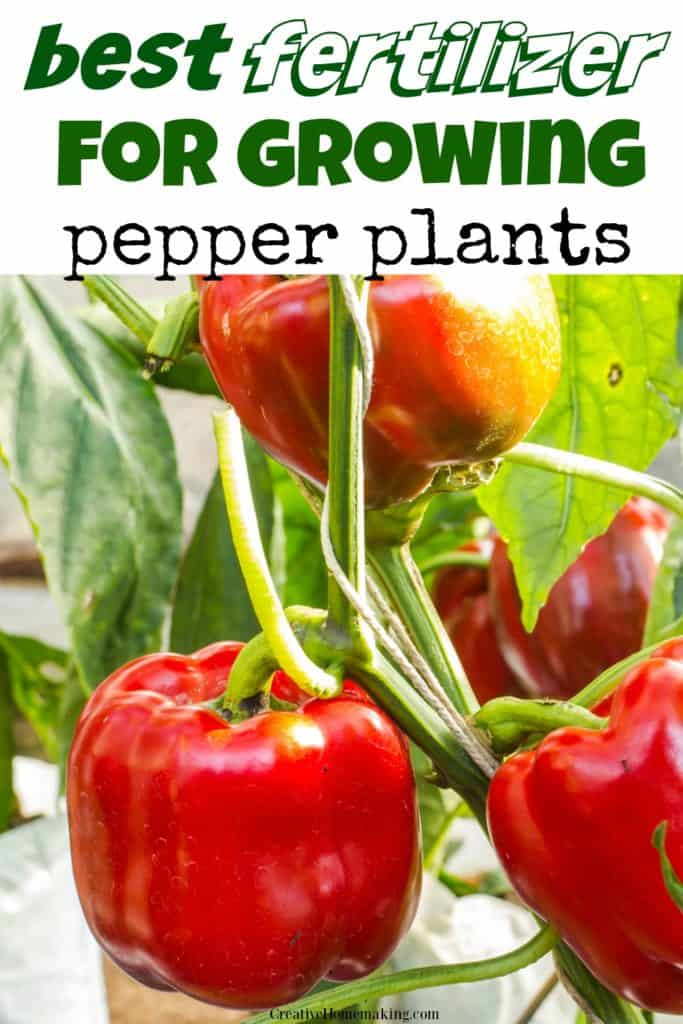Premier Fertilizers for Peppers: Improve Your Harvest High Quality
Premier Fertilizers for Peppers: Improve Your Harvest High Quality
Blog Article
Organic Vs. Synthetic Fertilizers: Which Is Best for Nurturing Healthy Pepper Plants?
In the world of supporting healthy pepper plants, the choice between synthetic and organic plant foods stands as an essential decision with far-reaching effects. While both alternatives goal to offer important nutrients to sustain plant development, the nuances of their effect on the dirt, plant wellness, and the atmosphere spark a debate that mirrors throughout the gardening area. Recognizing the distinct benefits and prospective pitfalls of each plant food type is crucial for pepper farmers seeking to optimize their returns while maintaining a lasting and eco-conscious strategy.
Benefits of Organic Plant Foods
Organic fertilizers supply a lasting and environmentally-friendly method to beneficial pepper plants, supplying vital nutrients without making use of synthetic chemicals. These all-natural fertilizers are stemmed from organic resources such as compost, manure, bone dish, and seaweed, promoting dirt health and wellness and biodiversity. Unlike artificial fertilizers, natural options release nutrients gradually, guaranteeing a constant and balanced supply for pepper plants to flourish.
One substantial benefit of natural plant foods is their ability to enhance dirt structure and water retention. By improving dirt health, organic plant foods advertise advantageous microbial task, which assists in nutrient uptake by pepper plants. Additionally, natural plant foods decrease the danger of chemical run-off, shielding water sources from contamination and securing the setting.
Additionally, organic plant foods add to lasting soil fertility by promoting the growth of helpful dirt microorganisms. These microorganisms help break down organic matter, launching nutrients in a type that is conveniently obtainable to pepper plants. best fertilizers for peppers. By fostering a healthy soil ecosystem, organic fertilizers support sustainable pepper growing methods that benefit both plants and the atmosphere
Disadvantages of Artificial Plant Foods
Artificial plant foods, as opposed to their natural equivalents, present numerous negative aspects when made use of to nurture pepper plants, influencing both plant wellness and ecological sustainability. One significant disadvantage of synthetic fertilizers is their tendency to leach nutrients from the dirt promptly. This fast leaching can cause nutrition discrepancies in the soil, causing plants to experience deficiencies or toxicities. Furthermore, synthetic fertilizers can damage valuable dirt organisms, such as earthworms and useful bacteria, disrupting the dirt environment's balance.
Additionally, the overuse of synthetic plant foods can add to water pollution. Excess plant foods not taken in by plants can get rid of right into water bodies, resulting in eutrophication, where algae blooms diminish oxygen degrees in the water, hurting water life. Synthetic fertilizers are typically obtained from non-renewable resources, such as fossil fuels, adding to carbon emissions and ecological deterioration throughout their production.
Nutrient Absorption Contrast
When comparing artificial and natural plant foods in terms of nutrient absorption, natural plant foods have the advantage of offering a much more balanced and slow-release source of nutrients. Organic fertilizers consist of a selection of macro and trace elements that are not just advantageous for the plants however likewise promote healthy soil microbial activity, which aids in nutrient uptake.
Furthermore, organic fertilizers enhance soil framework and water retention ability, permitting pepper plants to accessibility nutrients more efficiently. This better dirt top quality promotes origin growth, making it possible for far better nutrient absorption. Artificial fertilizers, although at first increasing plant growth due to their high nutrient focus, might impede long-lasting nutrient absorption by degrading soil wellness with time.
Ecological Effect Considerations

On the other hand, synthetic plant foods, although commonly more right away available and focused to plants, can have detrimental effects on the atmosphere otherwise used appropriately (best fertilizers for peppers). Their manufacturing requires high power inputs, resulting in greenhouse gas exhausts and adding to environment change. Moreover, the overflow of excess synthetic fertilizers can infect water sources, leading to eutrophication and damaging water ecosystems.
Finest Plant Food Practices for Peppers
To achieve this, it is important to comply with best fertilizer techniques customized to the i thought about this certain needs of pepper plants. One important practice is to perform a soil test prior to using any plant foods.
Another vital method is to feed pepper plants at the correct time. Usually, peppers benefit from obtaining fertilizer at planting and then once again when they begin to flower. Over-fertilizing can result in nutrition inequalities and damage the plants, so it is crucial to comply with advised application rates.
In addition, choosing a balanced plant food with an NPK proportion that suits pepper plants' demands is basic. Inevitably, combining natural and synthetic plant foods sensibly can aid nurture healthy pepper plants while lessening ecological effect.
Verdict

Organic fertilizers provide an environmentally-friendly and sustainable technique to nourishing pepper plants, offering visit the website crucial nutrients without the usage of synthetic chemicals. Unlike artificial plant foods, natural options launch nutrients gradually, making sure a consistent and balanced supply for pepper plants to flourish.
Synthetic fertilizers, in contrast to their natural counterparts, posture different disadvantages when used to nurture pepper plants, impacting both plant health and ecological sustainability. When contrasting organic and synthetic plant foods in terms of nutrient absorption, natural plant foods have the advantage of supplying a more balanced and slow-release source of nutrients.Moreover, natural fertilizers improve dirt framework and water retention capability, allowing pepper plants to access nutrients extra efficiently.
Report this page